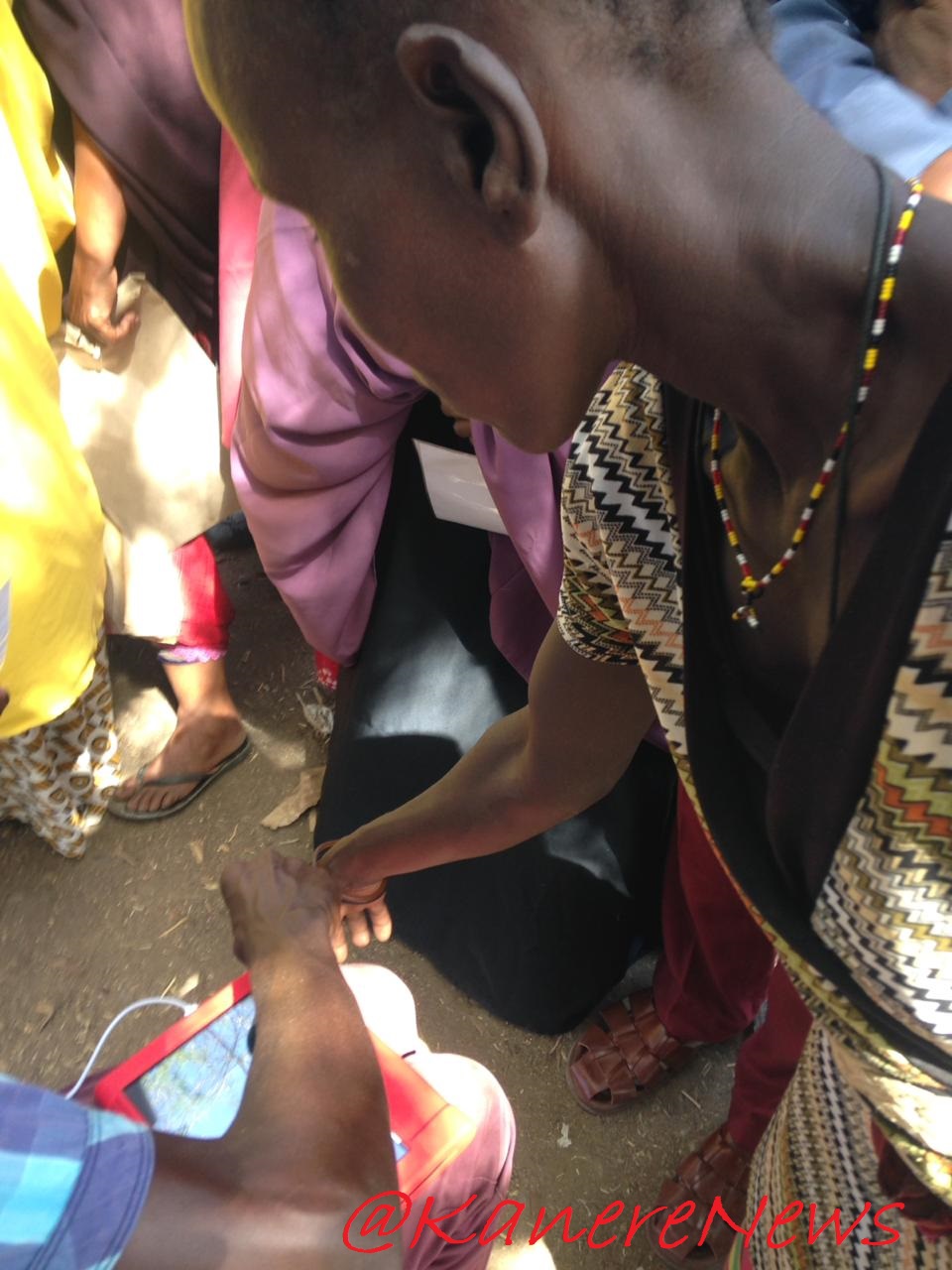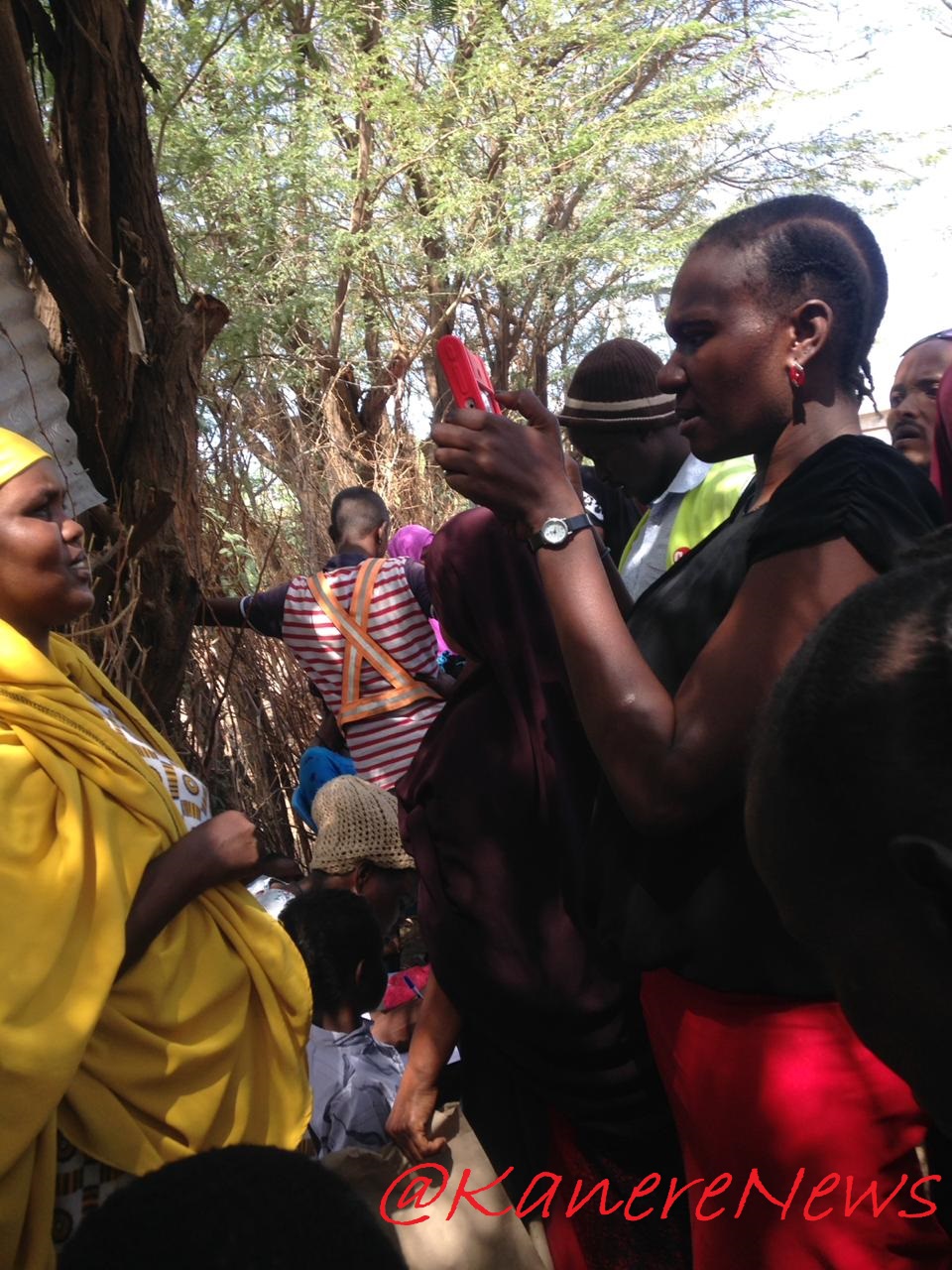By Ibrahim with Qaabata – KANERE Staff writers April 2019
With the aim of creating a centralized database of everyone residing in Kenya, including foreigners and refugees, the government launched a nationwide bio-metric registration that includes refugee camps.
Everyone who registers receives unique number better known as Huduma Namba (Service Number) generated by the National Integrated Identity Management System (NIIMS), according to the Executive Order No. 1 of 2018, which is attached to their biometric data including fingerprints and facial recognition. Registration in Kakuma was launched at Food Distribution Center 1 on the morning of 13thApril. The registration operation was to continue for 52 days
The National Integrated Identity Management System (NIIMS) is a national program for the mandatory registration of all Kenyan citizens and registered foreigners resident in Kenya.
The government is undertaking the biometric registration process in an attempt to prevent impersonation and fraud, authenticate personal data, and enhance access to government services. However, the programme has been criticized by citizens and right groups. The right groups including Kenya Human Rights Commission (KHRC), the Kenya National Commission on Human Rights (KNCHR) and the Nubian Rights Forum (NRF) claim that the process of publicizing citizens’ private information is a violation of the constitution, which states that every person has a right to private information.
Compared to citizens, the government has spent less time promoting the registration of refugees. Neither UNHCR nor the national government’s Refugee Affairs Secretariat (RAS)- which is the office in charge of Refugee operations in Kenya – has commented on the ongoing biometric registrations of refugees in Kakuma. This silence has left some camp resident feel uninformed.

Refugees interviewed by KANERE claimed that they have not yet received information through their zonal, block, or community leaders. Some Christians in the camp, mostly from South Sudan, refused to participate, claiming that the registrations are against their religious beliefs. “If this exercise is legitimate then why was it not passed through the channel of communication, from UNHCR to the Zonal Leaders and then to Block Leaders?” asked one pastor of the Presbyterian church of South Sudan.
Others were simply confused about the logic of the programme. MuziBaraa, a Block leader in Zone 2, commented, “I am registered under UNHCR here in Kakuma. Why should I register in an exercise that was designed for citizens?”
“I called UNHCR hotline and they said only refugees are required to register “explained Aba Arsi, a refugee who crossed the border from Ethiopia in 2001.
There are questions about the rigor of the registration in the camp. Refugees reported registering with a variety of documents; including Refugee IDs and UNHCR issued proofs of registration.
Given the nationwide warning circulated by the government, anyone who fails to register may be denied government services. As such, the lack of information among refugees could cost them in the future.
The threat to deny government services to anyone without a Huduma Namba has negative implications for refugees and asylum seekers in Kenya whose movement relies on acquisition of a travel permit from RAS. Moreover, as UNCHR continues the gradual process of handing over refugee operations to the government, failure to register may cause problems for asylum seekers attempting to undergo refugee status determination, or to receive a ration card.
According to an Amnesty International report on 1stApril, “The current legal NIIMS framework raises serious human rights concerns including the fundamental right to privacy as enshrined in Article 31 of the Kenyan Constitution and Article 17 of the International Covenant on Civil and Political Rights.”
Irũngũ Houghton, Amnesty International Kenya’s Executive Director Statement claimed, “Kenya’s mandatory biometric registration system legal framework poses a massive risk to the right to privacy of citizens, foreign nationals and refugees living in the country. Parliament should swiftly repeal the invasive sections and expedite the National Taskforce’s Data Protection Bill to bring forth a legal framework for safeguarding personal data”.
South Sundance refugees interviewed by KANERE claimed they would continue to resist the registration, calming that it will contradict their religious beliefs. Many South Sudan refugees have boycotted the registrations and some are even allegedly leaving to Uganda to avoid the Huduma registrations.
Gorge Bol, a Nuer community leader, told KANERE, “We have received directions from our Bishops in Nairobi that we should not register for this Huduma “thing”.
Due to religious issues, some Christian refugees from Ethiopia, Rwanda, Brundi and Congo also claim that they will not register.
“I would not give my life to the 666,” explained Pastor Niramakzira, a Burundian Pastor from MCK church in Kakuma. The number 666 refers to “the Beast” in Christian cosmology. “Beware, we are now at the end of the world and the beast is taking everything that belongs to him. Please read Revelations 13:18 versus 16-18.”
In places like Hong Kong, a neighborhood of the camp occupied predominantly by Dinka people from South Sudan, officers registering for HudumaNamba were attacked and chased. To avoid further attack, they have been working under protection at a local police station based in Zone One.
A five-minutes religious video, published anonymously on YouTube with the title of “A voice in the Desert.” explains how people can escape the Mark of the Beast in Kenya and elsewhere by understanding God’s plan and acting on it by citing evidence from the New Testament, Revelations 13:18. The video has circulated widely; including among Christian refugees in Kakuma.
Another point of confusion among refugees relates to nationality claims. Some Somalis have been concerned that Huduma Namba registration might affect their resettlement process. Some assume that Huduma Namba registration might revoke their status by suggesting that they intend to pursue local integration in Kenya.
“Refugees are advised to register before the expiry deadline,” an anonymous officer explained to KANERE while carrying out registrations. “Huduma Namba registrations do not make you a Kenyan citizen. You will still remain a refugee.”
Despite concerns about privacy, religious ramifications, and resettlement applications, Somalis and Ethiopians have been registering in good number since the start of the exercise.

Ethiopian community council elder Daniel mused, “Refugees are funny. We gave our fingerprints and retina scan in the 2016 verifications. We gave our fingerprints to the government on so many occasions, including when applying for Refugee IDs. The government has data on the entire refugee population, and so I have no reason not to register now because of concerns about data breaches.”
Compared to Kakuma camp, the registrations at Kalobeyei Integrated Settlement are quite different. Due to increased insecurity and related fatalities, residents have stated that they will not register until the concerned body comes to discuss with them.
A Village Three representative explained, “We are calling to UNHCR representatives for a meeting to discuss the insecurity issues here. But no one has come, so we decided to boycott this Huduma registration .And we will continue to do so until they come.”
According to information released by government, the personal details of all registered individuals stored at the NIIMS will be linked with various national government agencies. The linked data is relayed in real time to government agencies including the Lands Registry, National Social Security Fund, law enforcement agencies, National Hospital Insurance Fund, Kenya Revenue Authority, financial agencies, immigration office, National Transport and Safety Authority, Independent Electoral and Electoral and Boundaries Commission, and universities.
KANERE media has been requesting comment from the UNHCR, but we have not received a response.

1 reply on “Biometric Registration faces strong religious resistance in Kakuma”
[…] Ugandan, Rwandan, Somali, Sudanese and Kenyan journalists operating in Kakuma Refugee Camp, recorded some of these instances. H.E President Uhuru Kenyata had to address the […]